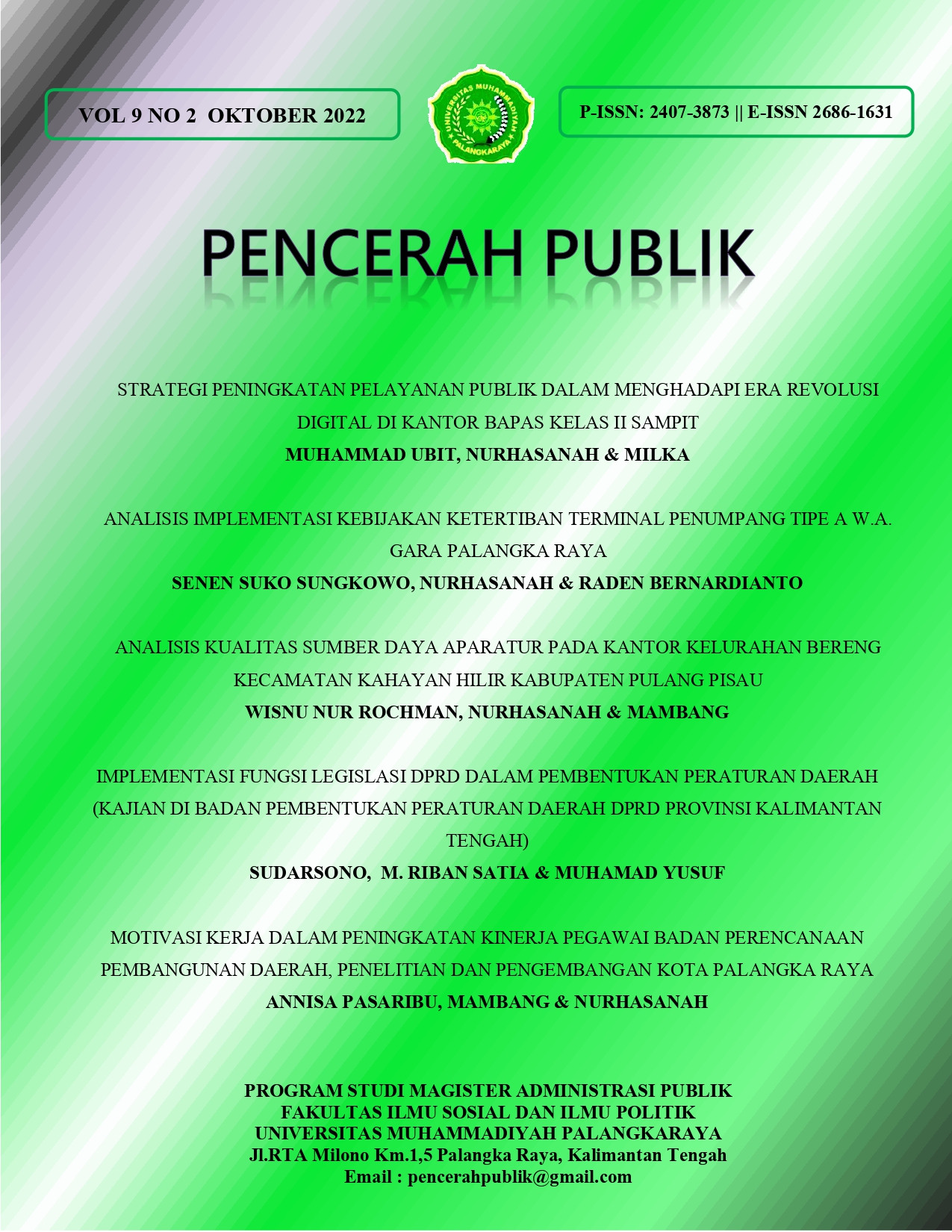MODEL LAYANAN PUBLIK RAMAH DIFABEL INISIATIF MEMBANGUN KOTA INKLUSI Diffabble-Friendly Public Service Model Building Initiatives the City of Inclusion
Main Article Content
Abstract
Disability is a complex issue at all levels of society. Disabilities include people with physical and psychological deficiencies in society. So the mention of people with disabilities can be more familiar by calling them disabled. With the diffable predicate, people can easily divide their social strata with 'normal people' rather than 'disabled/disabled people'. The purpose of this research is to find ideas and theoretical foundations that can be used to define "inclusive cities." Because definitions alone are not enough, this article will also examine indicators of inclusive cities. This study uses qualitative research. Based on the theoretical studies conducted, the authors argue that there are four indicators of an inclusive city: (i) the participation of persons with disabilities; (ii) there are efforts to fulfill the rights of persons with disabilities; (iii) guaranteed accessibility; and (iv) the inclusive attitude of the city residents.
Downloads
Article Details

This work is licensed under a Creative Commons Attribution-ShareAlike 4.0 International License.
Authors who publish with this journal agree to the following terms:
- Any article on the copyright is retained by the author(s).
- Author grant the journal, right of first publication with the work simultaneously licensed under a Creative Commons Attribution License that allows others to share work with acknowledgment of the work authors and initial publications in this journal.
- Authors are able to enter into a separate, additional contractual arrangements for non-exclusive distribution of published articles of work (eg, post-institutional repository) or publish it in a book, with acknowledgment of its initial publication in this journal.
- Authors are permitted and encouraged to post their work online (e.g., in institutional repositories or on their websites) prior to and during the submission process, as can lead to productive exchanges, as well as earlier and greater citation of published work.
- The article and any associated published material is distributed under the Creative Commons Attribution-ShareAlike 4.0 International License
References
About the Inclusive Cities Project. (n.d.). Retrieved from http://www.inclusivecities.org/about_us/
Barnes, C., & Mercer, G. (2006). Disability, Work, and Welfare: Challenging the Social Exclusion of Disabled People. Peace Research Abstracts Journal, 43(1).
Barnes, C., Oliver, M., & Len, B. (2002). Disability Studies Today. Cambridge: Polity Press.
Behrens, M., Bukow, W.-D., Cudak, K., & Strünck, C. (2016). Inclusive City: Überlegungen Zum Gegenwärtigen Verhältnis Von Mobilität Und Diversität in Der Stadtgesellschaft. Retrieved from http://search.ebscohost.com/login.aspx?direct=true&scope=site&db=nlebk&db=nlabk&AN=1046671
Burchardt, T., Le Grand, J., & Piachaud, D. (1999). Social Exclusion in Britain 1991-1995. Social Policy And Administration, 33(3), 227–244
Commentary: What We Mean By ‘Inclusive Cities’ – The Informal City Dialogues. (2013, January 28). Retrieved 13 January 2017, from https://nextcity.org/informalcity/entry/commentary-what-we-mean-by-inclusive-cities
Budiono, Kusumohamidjojo. 2000. Kebhinekaan Masyarakat di Indonesia. Jakarta: Grasindo
Devlieger, P. (2003). Rethinking Disability: The Emergence of New Definitions, Concepts and Communities. Garant.
Diskusi Desa Inklusi dalam Jagongan Media Rakyat 2016. (2016, April 21). Retrieved 13 January 2017, from http://desainklusi.sigab.or.id/berita/2016/04/21/diskusi-desa-inklusi-dalam-jagongan-media-rakyat-2016/
Eide, A. H., & Ingstad, B. (2011). Disability and Poverty: A Global Challenge. Bristol: Policy Press. Retrieved from http://public.eblib.com/choice/publicfullrecord.aspx?p=726872
Espino, N. A. (2015). Building the Inclusive City: Theory and Practice for Confronting Urban Segregation.
Goltsman, S. M., & Iacofano, D. S. (2007). The inclusive city: design solutions for buildings, neighborhoods and urban spaces. Berkeley, Calif.: MIG Communications.
Goodley, D. (2011). Disability Studies: An Interdisciplinary Introduction. London: SAGE Publications.
Hadi Rudyatmo Mencanangkan ‘Solo Kota Inklusi’. (2013, September 29). Retrieved 13 January 2017, from http://www.pikiran-rakyat.com/pendidikan/2013/09/29/252837/hadi-rudyatmo-mencanangkan-solo-kota-inklusi
Hanson, J. (2004). The Inclusive City: Delivering a More Accessible Urban Environment Through Inclusive Design. In Presented at: RICS Cobra 2004 International Construction Conference: responding to change. (2004). York, UK. Retrieved from http://discovery.ucl.ac.uk/3351/
Harris, A., Enfield, S., & Oxfam GB. (2003). Disability, Equality, and Human Rights a Training Manual for Development and Humanitarian Organisations. Oxford: Oxfam. Retrieved from http://publications.oxfam.org.uk/oxfam/add_info_020.asp
Hasbullah, J. 2006. Social Capital (Menuju Keunggulan Budaya Manusia Indonesia. Jakarta: MR.United Press Jakarta.
Inclusive Cities: Overview. (2015, October 29). [Text/HTML]. Retrieved 13 January 2017, from http://www.worldbank.org/en/topic/urbandevelopment/brief/inclusive-cities
Kurniawan, H. (2014). Tipologi Renovasi Aksesibilitas Halte Trans Jogja. INKLUSI, 1(1), 1–18.
Laquian, A. A., Tewari, V. K., & Hanley, L. M. (2007). The Inclusive City: Infrastructure and Public Services for the Urban Poor in Asia. Washington, D.C.; Baltimore: Woodrow Wilson Center Press ; Johns Hopkins University Press.
Maftuhin, A. (2014). Aksesibilitas Ibadah bagi Difabel: Studi atas Empat Masjid di Yogyakarta. INKLUSI, 1(2), 249–268.
Manual Making PRSP Inclusive: 6.1.1 The four models. (n.d.). Retrieved 23 January 2017, from http://www.making-prsp-inclusive.org/6-disability/61-what-is-disability/611-the-four-models.html
Millati, S. (2016). Disability Policy in Indonesia A Critical Discourse Analysis. the University of Sheffield, Sheffield. parenting- Hak Anak Difabel. (n.d.). Retrieved 20 January 2017, from http://www.republika.co.id/berita/koran/leasure/14/12/16/ngny4a4-parenting-hak-anak-difabel
Peringati Hari Disabilitas Internasional, Pemkot Canangkan Empat Kecamatan Inklusi. (2015, June 12). Retrieved 13 January 2017, from http://www.jogjakota.go.id/news/Peringati-Hari-Disabilitas-Internasional-Pemkot-Canangkan-Empat-Kecamatan-Inklusi
Pierson, J. (2010). Tackling Social Exclusion. New York, NY: Routledge. Retrieved from http://site.ebrary.com/id/10349708
Salim, I., Syafi’i, M., & Elisabeth, N. (2015). Indonesia dalam Desa Inklusi. Sleman, Yogyakarta: Sigab.
Setidaknya 18.800 orang masih dipasung di Indonesia. (2016, March 21). Retrieved 20 January 2017, from http://www.bbc.com/indonesia/berita_indonesia/2016/03/160320_indonesia_hrw_pasung
Sheppard, M. (2006). Social Work and Social Exclusion: The Idea of Practice. Aldershot, England; Burlington, VT: Ashgate. Retrieved from http://site.ebrary.com/id/10211147
Sosialisasi Pendidikan Inklusif Menuju Solo Kota Inklusi. (n.d.). Retrieved 13 January 2017, from http://www.surakarta.go.id/konten/sosialisasi-pendidikan-inklusif-menuju-solo-kota-inklusi
